|
|
|
Sort Order |
|
|
|
Items / Page
|
|
|
|
|
|
|
| Srl | Item |
| 1 |
ID:
163455
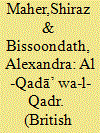

|
|
|
|
|
| Summary/Abstract |
This paper explores how the normative Islamic concepts of divine decree and predestination are used for motivational purposes in salafi-jihadi literature. These concepts are known as al-qaḍā’ wa-l-qadr within Islamic jurisprudence and assert that certain characteristics in an individual’s life—such as their lifespan, wealth and progeny—have already been preordained by God. Salafi-Jihadi groups, not least al-Qaeda and Islamic State, frame these concepts in unique and important ways to motivate their fighters on the battlefield, liberating them from fear of personal consequences. In particular, we examine the use of this concept not just to motivate fighters at a personal level, but also its role in maintaining morale during times of hardship, its ability to explain away failures and defeats, and its ability to project both momentum and success even when the facts suggest otherwise.
|
|
|
|
|
|
|
|
|
|
|
|
|
|
|
|
| 2 |
ID:
163457
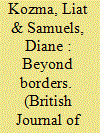

|
|
|
|
|
| Summary/Abstract |
This article examines the post-Second World War regionalization and internationalization of public health by focusing on the 1947 cholera epidemic in Egypt. We argue, first, that for the Egyptian medical profession, the epidemic served as an opportunity for both anti-colonial critique and soul-searching and self-criticism: it attested to the poor medical condition of the Egyptian countryside and the work required to ameliorate it. Second, we place the Egyptian epidemic in its regional context. We show how travel restrictions affected the mobility of people and merchandise between Egypt and its neighbours, as newly formed borders were solidified, crossed or transgressed. At the same time, the epidemic served as an opportunity for Arab solidarity. Finally, the since epidemic erupted during the short term of the WHO’s Interim Commission, Egypt served as the WHO’s first testing ground, helping to prove its capability to mobilize medical assistance, disseminate medical alerts and negotiate the abolition of quarantine restrictions. The epidemic, moreover, erupted against the background of renegotiation of international sanitary conventions, which historically placed cholera and the Muslim pilgrimage to the Hejaz at their centre. The source of the epidemic in a British military base and Egypt’s ability to contain the epidemic resonated with on-going debates over international travel restriction, international health policies and local sovereignty. The 1947 cholera epidemic was thus, a defining moment in the emerging relationship between international organizations and the decolonizing world.
|
|
|
|
|
|
|
|
|
|
|
|
|
|
|
|
| 3 |
ID:
163454
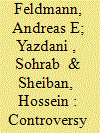

|
|
|
|
|
| Summary/Abstract |
The Iranian constitutional revolution of 1906–09 paved the way for the establishment of new administrative institutions, adopting modern ideas and the hegemony of new political discourse over the archaic political reasoning. One of the most important aspects of the new discourse was the definition and internalization of modern concepts. This paper holds the view that the concept ‘freedom’ brought about a complicated problem for the socio-political sphere in the course of the Iranian revolution and, as such, deserves a thorough examination. Previous studies on the subject have usually neglected this aspect. Yet, this was exactly the main domain of the clash between traditionalism and modernity during the revolutionary years and brought about far-reaching results for Iranian society. This article attempts to contribute to this field by examining a number of Iranian journals of the period in order to evaluate their understanding of the concept ‘freedom’ and show the discrepancy between the constitutionalist and non-constitutionalist discourses.
|
|
|
|
|
|
|
|
|
|
|
|
|
|
|
|
| 4 |
ID:
163463
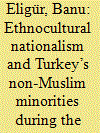

|
|
|
|
|
| Summary/Abstract |
his article analyses the Turkish nationalist elite’s economic and demographic Turkification policies toward the non-Muslim minorities in the 1920s and 1930s, and argues that the nationalist elite pursued ethnocultural nationalism toward the country’s non-Muslim citizens, while applying civic-territorial nationalism toward Muslim Turks. The article maintains that the nationalist elite, like the Young Turk regime, aimed at forming a national Turkish Muslim businessmen class at the expense of the non-Muslim minorities by pursuing economic and demographic Turkification policies.
|
|
|
|
|
|
|
|
|
|
|
|
|
|
|
|
| 5 |
ID:
163459


|
|
|
|
|
| Summary/Abstract |
The article examines the role of rap in reimagining the social structure in Tunisia after its 2010/2011 revolution. Before the revolution, the Ben Ali regime imposed a narrative of Tunisian society as mainly middle class; beneath this narrative, the Tunisian folklore hosted multiple markers of social distinction that classified people through their perceived lifestyles: residence, language habits, consumption patterns, religious attitudes. Disadvantaged neighbourhoods were obliterated by the official narrative and condemned to social spite by the unofficial ones. After the revolution, the success of rap came to ‘represent’ those quarters and the youth that inhabited them: rappers sang the hoods by criticizing their hard conditions and, at the same time, glorifying the hoods themselves. The vagueness of the social narratives in the country allowed rap musicians to manipulate both the image of the poor neighbourhoods and the idioms of social difference circulating in Tunisia: through this manipulation, they provided a new dignity to the most marginalized sectors of Tunisian society. At the same time, by representing the hoods, rappers could claim social capital and credibility as the ‘true’ narrators of the new Tunisia. But the reimagination of social narratives was not enough to improve the life conditions of dispossessed youth.
|
|
|
|
|
|
|
|
|
|
|
|
|
|
|
|
| 6 |
ID:
163460
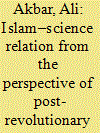

|
|
|
|
|
| Summary/Abstract |
Throughout Islamic history, various arguments have been raised by Muslim scholars concerning how the Quran and scientific knowledge are related to one another. This paper seeks to examine how contemporary Iranian religious intellectuals (rowshanfekrān-e-dīnī) have dealt with the question of the compatibility or incompatibility between Islam and science. In particular, the paper focuses on the writings of two of the most significant reformers of the post-revolutionary era, namely Abdolkarim Soroush and Muhammad Mujtahed Shabestari, concerning the relation between science and religion. The paper also examines the extent to which the ideas of these two thinkers about the relation between Islam and science reflect those of pre-modern and modern Muslim scholars. To do so, I first examine various pre-modern and modern discourses within the Islamic tradition about Islam–science relation as well as the scientific exegesis of the Quran, and then investigate the extent to which Soroush’s and Shabestari’s perspectives are related to such discourses. The central argument of the paper is that the theories proposed by Soroush and Shabestari significantly differ from the views of those modern and pre-modern Muslim scholars who attempt to argue in favour of the dichotomous view that Islam is either compatible or incompatible with scientific knowledge.
|
|
|
|
|
|
|
|
|
|
|
|
|
|
|
|
| 7 |
ID:
163456
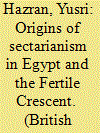

|
|
|
|
|
| Summary/Abstract |
This paper differs from previous studies in arguing that sectarianism has overwhelmingly been created consensually by/or as a result of the elites’ behavioral patterns. Religious or communal pluralism does not categorically lead to political sectarianism; The development of pluralism into political sectarianism can thus be adduced as dependent upon other factors—first and foremost the behavioural patterns of the elite. While the imperial legacy, theological controversies, and socio-economic gaps feed political sectarianism, in and of themselves they are insufficient to cause it. A survey of the history of Egypt and the other countries in the Fertile Crescent reveals that the development of political sectarianism or sectarian violence has been organically linked to elites' political behaviors and interests. sectarianism takes the form of the instrumental exploitation of a religious or communal identity or framework in order to enable political organization, the gaining of political legitimacy, the promotion of political change, or the preservation of the control held by interest groups. While in the eyes of many critics, sectarianism forms a striking example of the elites' intrinsic weakness, sectarianism is first and foremost a product of the elites’ quest for power.
|
|
|
|
|
|
|
|
|
|
|
|
|
|
|
|
| 8 |
ID:
163462
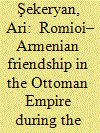

|
|
|
|
|
| Summary/Abstract |
he Romioi–Armenian friendship, which emerged after the signing of the Armistice of Mudros in October 1918, portrays a unique chapter in the history of Romioi–Armenian relations. During this distinct period, the two communities forged strong bonds over their mutual opposition against the Ottoman state. They drafted common political plans and strategies, established friendship organizations in Istanbul, organized gatherings, and the Armenian and the Ecumenical Patriarchates even entered into a discussion to unite the two churches. Thus, the relationship between the Armenian and the Romioi communities during the Armistice period holds significance in the broader context of the history of Greek–Armenian relations. This article explores the extent of the Romioi–Armenian friendship during the Armistice period through an extensive collection of primary sources including Armenian and Ottoman Turkish newspapers in order to demonstrate how the community leaders worked to improve relations between the Armenian and Romioi communities.
|
|
|
|
|
|
|
|
|
|
|
|
|
|
|
|
| 9 |
ID:
163464
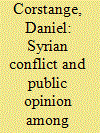

|
|
|
|
|
| Summary/Abstract |
Whom do ordinary Syrians support in their civil war? After decades of repression, the Syrian uprising unleashed an outpouring of political expression. Yet the study of Syrian public opinion is in its infancy. This article presents survey evidence from a large, diverse sample of Syrian refugees in neighbouring Lebanon, one of the first of its kind, and examines their support for the different factions fighting in the civil war. In so doing, it demonstrates that many conventional narratives of the conflict are oversimplifications of a more complex reality. The survey shows that the majority of Syrian refugees support one faction or another of the opposition, but a large minority sympathizes with the government. In line with existing accounts of the war, the government draws its popular support base from wealthier and less religious Syrians, as well as minorities. Nonetheless, large numbers of Sunni Arabs also side with the government, belying sectarian narratives of the war. The survey also finds that supporters of the opposition Islamists and non-Islamists are similar in many regards, including religiosity. The main distinction is that the non-Islamist support base is far more politically attentive than are Islamist sympathizers, in contrast to existing narratives of the war.
|
|
|
|
|
|
|
|
|
|
|
|
|
|
|
|
| 10 |
ID:
163458
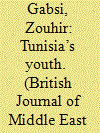

|
|
|
|
|
| Summary/Abstract |
This paper examines Tunisian youths’ sense of identity and how it is influenced by the economic malaise that the country has experienced since the revolution; this is despite the relative success of the Arab Spring at inciting the country’s political transition to democracy. Although young people appreciate new-found freedoms of expression and association in post-Arab Spring Tunisia, the economy, acquiescent to the neoliberal model and weighed down with corruption and political marginalization, has deprived many of a dignified existence. The research reported in this paper surveys over 100 youth chosen from northern, coastal, central and southern parts of Tunisia. It examines how Tunisian youth view the Arab Spring in the context of unstable socio-economic and political environments. To most surveyed youths, the Arab Spring is a failure in socio-economic terms, but it is also an occasion to reassert their Tunisian identity.
|
|
|
|
|
|
|
|
|
|
|
|
|
|
|
|
| 11 |
ID:
163461
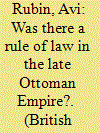

|
|
|
|
|
| Summary/Abstract |
The rule of law is a widely used term in scholarship on Ottoman legal reforms. Nevertheless, the actual meaning of this notion is rarely clarified in the writing on the late Ottoman Empire although theorists of law have discussed the ambiguity of this term. This article aims at examining the value of the rule of law as an analytical category when discussing socio-legal change in the late Ottoman Empire. The article demonstrates that the rule of law can be a meaningful category for historical analysis when conceived through a ‘cultural perspective’ to the law.
|
|
|
|
|
|
|
|
|
|
|
|
|
|
|
|
|
|
|
|
|